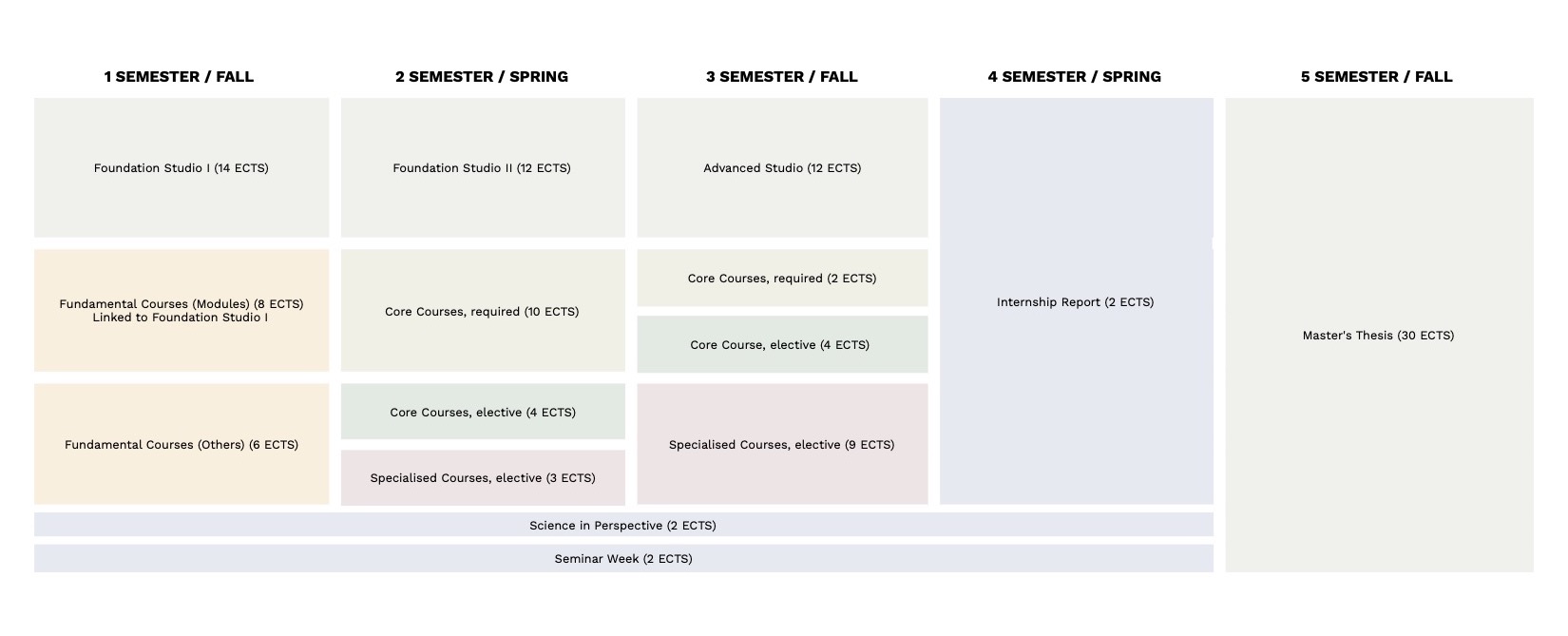Curriculum
Structure Overview
Program Structure
The Master’s degree program in Landscape Architecture is full-time, and lasts four semesters plus six months for the required internship.
The program is structured into fundamental, core and specialized courses, seminar weeks, and design studios. Complementary to these courses, the students choose a ‘science in perspective’ course that contextualizes the scientific knowledge and technologies of the program. The linking of subject-specific teaching contents with each other and their integration into the design studios is a central principle of the program.
The focus semester links the fundamental courses with the design lessons and creates a strong foundation for the following semesters. The design studios address pressing issues at a diversity of scales, from the hyper-local, to the regional and the global. The program concludes with a master’s thesis project on an original and relevant research topic.
In order to obtain the Master’s degree, students must have earned 120 ECTS credits in the following course categories: fundamental, core and specialized courses, design studios, seminar week, science in perspective, internship and internship report, master thesis. Download Learn more about the study guidelines here. (PDF, 320 KB)
Duration & Volume: 4 semesters + 6 months internship, full-time, 120 ECTS
Course Overview
The fundamental courses impart basic knowledge in landscape architecture. This includes skills of the scientific subjects botany, soil science, hydrology and climatology, and of the humanities subjects history and theory of landscape architecture, and ethics. Building on this, basic knowledge about designing with plants, materials and construction is imparted. The fundamental courses create the basis for the following semesters, taking into account the previous professional education of the students with a Bachelor’s degree in architecture. The knowledge is conveyed in lectures and exercises. The focus is on fundamental courses that are linked to Foundation Studio I in terms of content and method. All basic subjects are obligatory.
The design studios deal with problem- and practice-related tasks at local, regional, supra-regional, national and international scales.
The core courses impart basic, broad knowledge in the core areas of landscape architecture in relation to design. This includes skills about design elements, materials, construction techniques, designing with plants, law, moderation, urban ecology and other relevant subjects. The core courses are partly obligatory and partly optional.
The specialized courses are optional and offer students the opportunity to acquire in-depth knowledge in specific areas of landscape architecture.
The D-ARCH organizes one-week seminar weeks for all students each semester. Using examples of closely rewritten questions, on the one hand specialist knowledge is expanded, on the other hand the understanding of knowledge and areas of life in the environment of landscape architecture is deepened. At least one seminar week must be completed in the Master’s program.
The study program Science in Perspective enables students at ETH Zurich to develop new perspectives on their core courses about scientific and technological issues. It will examine, through seminars and lectures, the historical, moral, epistemological, legal, economic and political contexts without which science and technology would not be possible.
Part of the curriculum is a six-month internship in landscape architecture, i.e. in a project planning and implementation office, public institutions or related areas. At least three months of this must be completed without interruption at the same location. The internship can only be completed when Fundamental Studios I + II and Advanced Studio have been passed (i.e. internship after the third semester of the curriculum). Internship prior to the Master’s program are not accounted for.
The internship should include as many work phases as possible in the activity of a landscape architect. The students prepare an internship report which documents their achievements and reflects their learning success.
The Master’s thesis is the completion of the study program. It is intended to demonstrate the students‘ ability to design their own work and is proof of the successful completion of their studies. The students develop a solution to a problem- and practice-oriented task in the field of landscape architecture. All students will share a common site and region, that they will address at a scale of their choice. The Master’s thesis is headed by professors of the D-ARCH. It takes 14 weeks to complete.

